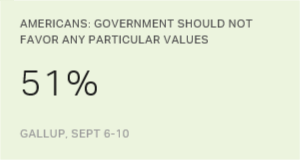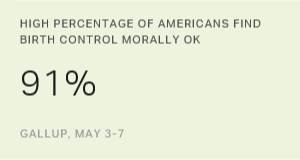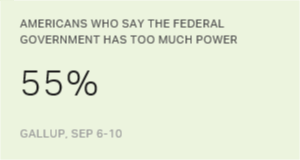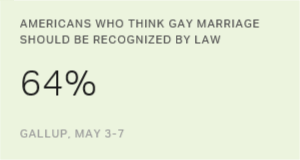Story Highlights
- 51% say the government should not favor any particular set of values in society
- Public leans against governmental advancement of values for third year in a row
- Republicans back values promotion by government; Democrats and independents don't
This story is part of a series focusing on Americans' confidence in various types of government, views of the political parties and of the role and power of government. Follow the series on our Government topic page.
WASHINGTON, D.C -- Given a choice, more Americans prefer that the government not advance any values (51%) than say it should "promote traditional values" (45%). This marks the third consecutive year that the public has favored government neutrality on advancing values. Before 2008, Americans consistently favored government promotion of traditional values.
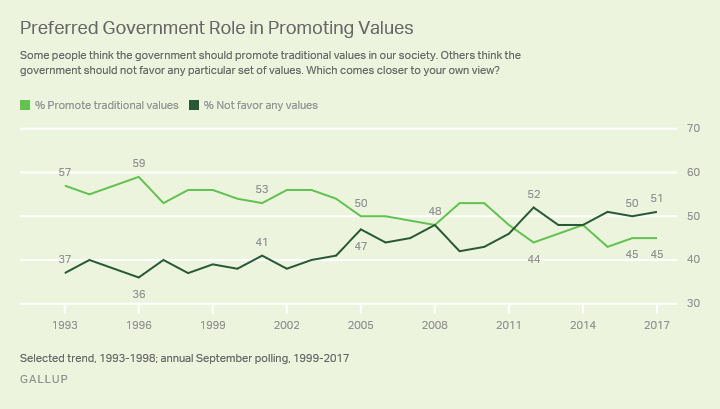
The latest result is from Gallup's annual Governance survey, conducted Sept. 6-10, and updates a question on the government's role in promoting traditional values first asked in 1993. In recent years, Americans have skewed toward thinking the government should remain neutral on values.
The erosion of support for governmental promotion of traditional values coincides with a recent Gallup finding that Americans have become increasingly liberal on a wide range of moral issues. Additionally, the percentage of Americans who describe themselves as liberal on social issues has nearly matched the percentage who say they are conservative, after many years of a significant conservative advantage.

Gallup Analytics
Subscribe to our online platform and access nearly a century of primary data.
Republicans Favor Promotion of Traditional Values
The movement away from the long-held view that government should promote traditional societal values has been driven primarily by Democrats and political independents, while Republicans remain relatively steadfast in favoring governmental promotion of traditional values.
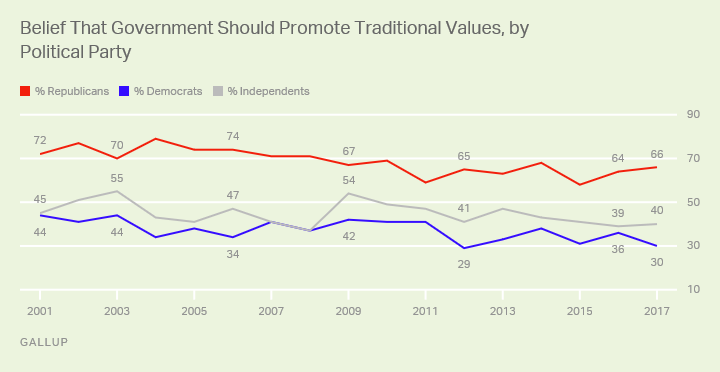
Paradoxically, Republicans' preference for an active governmental role in promoting traditional values contrasts with their preference for a more limited governmental role in economic and other matters. While Republicans have historically favored less government involvement in their lives, two-thirds want the government to play a role in instilling traditional values in society. This percentage is just modestly lower than figures for Republicans recorded in the previous decade. Republicans are more conservative than Democrats in their beliefs about moral issues, helping explain their consistent backing of a role for government in furthering traditional values.
Furthering Traditional Values More Popular With Older Americans, Women, Christians
In addition to Republicans, several subgroups of Americans are more likely than their counterparts to want the government to advance traditional values.
- 53% of Americans aged 55 and older think the government should promote traditional values; 34% of those aged 18 to 34 agree.
- 52% of self-identified Christians want the government to promote traditional values; 23% of those who do not identify with a religion agree.
- A 49% plurality of women support government promotion of traditional values; 41% of men agree.
While older Americans and Christians typically skew Republican, women are more likely to be Democrats.
Bottom Line
Americans' previously solid support for governmental advancement of traditional values has softened over the last few years. This has been driven by Democrats and independents, even as Republican support has remained firm.
While it is not clear exactly what respondents consider to be "traditional values" (the term is not defined in the survey question), the public's rejection of governmental promotion of them seems to track with a greater acceptance of a wide array of moral issues and an increasing tendency among Americans to identify themselves as socially liberal.
Survey Methods
Results for this Gallup poll are based on telephone interviews conducted Sept. 6-10, 2017, with a random sample of 1,022 adults, aged 18 and older, living in all 50 U.S. states and the District of Columbia. For results based on the total sample of national adults, the margin of sampling error is ±4 percentage points at the 95% confidence level. All reported margins of sampling error include computed design effects for weighting.
Each sample of national adults includes a minimum quota of 70% cellphone respondents and 30% landline respondents, with additional minimum quotas by time zone within region. Landline and cellular telephone numbers are selected using random-digit-dial methods.
View survey methodology, complete question responses and trends.
Learn more about how the Gallup Poll Social Series works.
